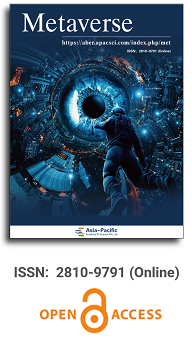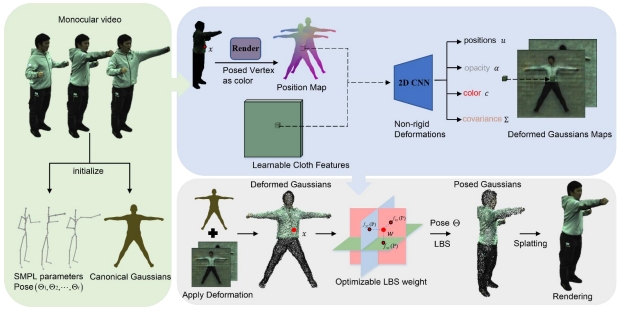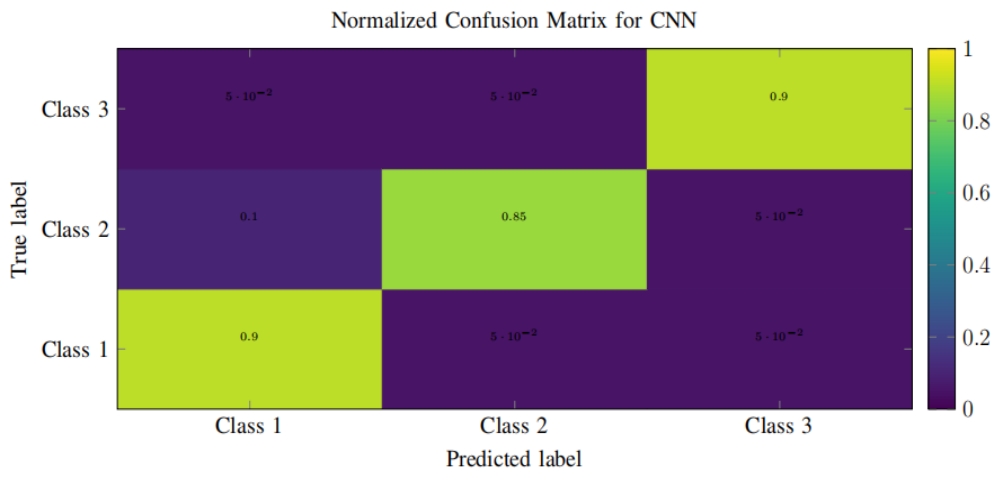
Asia Pacific Academy of Science Pte. Ltd. (APACSCI) specializes in international journal publishing. APACSCI adopts the open access publishing model and provides an important communication bridge for academic groups whose interest fields include engineering, technology, medicine, computer, mathematics, agriculture and forestry, and environment.



On September 23, an announcement sparked a lot of debate on the Internet. The School of Artificial Intelligence (School of Future Technology) of Nanjing University of Information Science & Technology (NUIST) renamed the Department of Information Engineering to the Department of Metaverse Engineering. Some netizens support the school's innovation, while others worry that the move is just chasing hotspots. "I'm still not clear what the Metaverse means.", "What can I do after learning this?", "It's excellent that a Chinese university is willing to chase this trend, after all, technology is the key to transforming the concept into wealth.", "I hope students can really learn something, but not a gimmick." What is the Metaverse? What is the reason for establishing the Department of Metaverse Engineering? How will the training of students be carried out? Will the admission criteria be adjusted? What are the ways out for this major? On October 26, Prof. Zhigeng Pan (shorted for P in the following dialogue), Dean of School of Artificial Intelligence (School of Future Technology) of NUIST, was interviewed by the Beijing News (shorted for B in the following dialogue), exclusively responding to the hot issues of public concern.
Talking about definition The Metaverse is an online virtual society, whose technology is called "BIG ANT".
B: Current definitions of the Metaverse are various, and many people feel that it is a rather vague concept. What do you think about the Metaverse? P: Now some people suspect that the concept is too huge. When I attended some events before, some investors were also very cautious. They were worried that the Metaverse was like a gust of wind, or what if it was a scam. I think the Metaverse is a virtual society online. It includes many technologies, and is an integration of many technologies. B: So what technologies are included specifically, please? P: Nowadays, the accepted technology has been vividly called "BIG ANT". The "B" is blockchain, which is an online virtual society to have transactions (economic activities), and blockchain ensures the traceability of transactions. "I" is interaction, through human-computer interaction, brain-computer interaction, sensor technology, etc. to reach the virtual environment and the interaction of the real environment. "G" is graphics, including the modeling, drawing and game engine of the scene. "A" is Artificial Intelligence (AI), each person has an avatar online. We now see that virtual people look relatively fake, because they own only movements but not thinking. Future virtual people will have memory, and functions of learning and reasoning, so AI is particularly important, like the brain. "N" is the network, moving so many things to the Internet, there is a very high demand for computing power; the network is only an infrastructure, just like human society has highways, we cannot say that human society is the highway. The "T" is the Internet of Things, which plays various sensing roles in the middle of the interconnection between the physical and virtual worlds. The six technologies cover the different stages of the computer from chip to network to application, which will have a very big push on information technology.
B: How do you understand the Metaverse in layman's terms? P: To use a figurative analogy, it is like a "Utopia", which will take a long time to be fully realized, and so is the Metaverse. Some people on the internet say it will take 5-10 years to fully realize the Metaverse, which I think is a bit too optimistic. However, some of these technologies can be applied first in industries such as healthcare, education, and conventions. I think that breakthroughs can be made in industries individually first (e.g. education Metaverse, medical Metaverse), to form a complete Metaverse at the end.
B: How can the application manifest itself? P: For example, we can see a doctor and visit each doctor in a virtual hospital on the network. It consists of many small applications divided into different stages, which may be primary Metaverse, intermediate Metaverse, and advanced Metaverse. Today's online medical visits are relatively simple, and can determine general headaches and fevers, but more complex conditions may not be determined. Doctors in Metaverse hospitals can read your face, smell your face, and take your pulse remotely to make a diagnosis.
B: Is the online virtual society a 1:1 replica of the real world? P: It is not a simple replica, the scenes in the Metaverse can be exactly the same as the real world or not, and it has more autonomous activities. For example, in the future, the real me is lying at home, and the virtual me is running to the hospital. If it is an exact replica, both of me are lying at home. The replica here is a replica of the environment, the human activity is variable.
B: It feels like a science fiction movie. P: (laughs) Right. So the Metaverse needs to have management norms. From what I understand, I hope that in the future each person will have only one incarnation, and one incarnation is like our ID card. Some organizations are already doing norms (also called standards) about the Metaverse. On the morning of September 21, 2022 EST, the Standards Council of the IEEE Standards Association approved the formal renaming of the former IEEE Virtual Reality and Augmented Reality Standards Committee to the IEEE Metaverse Standards Committee and the expansion of its scope of work.
Talking about courses Adding brain-computer interface and other Metaverse-related elective courses
B: Why did you change the name of the School's Department of Information Engineering to the Department of Metaverse Engineering? P: The name change is not original to us. In July this year, there was a similar initiative at the University of Tokyo in Japan. Our consideration is that, on the one hand, I have been engaged in Metaverse-related technology research for 30 years; on the other hand, since the second half of last year, the country has launched a research boom on Metaverse, and there are also more investments and policies, which involves the issue of Metaverse talent training, and what if there are not so many talents after enterprises get involved? Now there are some negative voices online, some people don't get the two different concepts of majors and departments. All majors must be in the professional catalog published by the Ministry of Education and managed by the relevant education departments; the name change of the department belongs to the autonomy of the university. Changing the Department of Information Engineering to the Department of Metaverse Engineering is to integrate the elements of the Metaverse in the teaching process, and we will also make some changes to the curriculum.
B: From the idea to the implementation of the name change, what preparations were made? P: In May 2021, this idea occurred to me after I came to work at NUIST, and the argument was also made in the first half of this year. A seminar on the integration of industry and education and a Metaverse summit were held in August. In these two events, we had in-depth communication with many universities and enterprises. Enterprises are more concerned about students' mastery of Metaverse knowledge, and some investment institutions are concerned about how enterprises can recruit relevant talents. Their needs prompted us to propose a name change after the summer. Besides companies, students are also interested in this and are concerned about companies' requirements for Metaverse talents and what they still need to learn. Since there is a demand from society and students have ideas, why don't we do it?
B: What changes will be made to the curriculum? P: Each major has its own training program, but the program can be revised. We have added some Metaverse-related optional courses, such as human-computer interaction technology, the foundation of virtual reality technology, blockchain technology, brain-computer interface, etc., so that students can learn more and understand more, which will also help them for the employment in the future.
In addition, some modules will be added to these courses, for example, blockchain-related content can be added to information security; the knowledge of human-computer interaction can be added to graphics.
Nowadays, the students are facing certain challenges in employment, and the main consideration at that time was to adapt to the market demand and promote higher quality employment for students.
B: How to guarantee the faculty? P: In the year when I have been the dean, the school has recruited nearly 20 faculty members whose research interests are related to virtual reality, artificial intelligence, and the Metaverse. There are also several computer-related schools in the university, with a total of more than 200 faculty members and key laboratories or engineering centers at the provincial levels.
In addition, the government emphasizes organized scientific research, the School of Artificial Intelligence has assembled three research teams: the Institute of Intelligent Meteorology, the Institute of Intelligent Medicine, and the Institute of Metaverse, which do both scientific research and lead students. The teachers of the team are also teaching, so that scientific research and talent training advance side by side.
B: After the name change, will the students who are currently studying in the Department of Information Engineering be affected? P: Of course, there are individuals who do not understand, so we explain that to them. After the name change, the curriculum remains largely the same, with only a few new optional courses, which makes the whole curriculum system is better. If students want to learn the original content, we do not force them to change, we just give them more opportunities to choose. As for the diploma and degree, according to the national regulations, only the name of the major studied will be shown (no department is shown).
Talking about teaching Reforming the training program will increase the integration of production and education
B: What are the majors under the original Information Engineering Department? What is the level in the country? What are the majors under the Department of Metaverse Engineering after the renaming? P: The School of Artificial Intelligence was built in 2019, with the Department of Information Engineering (major) and the Department of Artificial Intelligence (major), a department is a major. The major of Intelligent Medical Engineering that we recently applied for (to reserve the talents for the Institute of Intelligent Medical Research), if approved, it will be subsumed into the Department of Metaverse Engineering together with the major of Information Engineering. Subsequently, we will also apply to include the major of Virtual Reality.
The Computer Science of this university ranks in the top 1‰ of the world by ESI, and the School of Artificial Intelligence is based on this dominant discipline. [Note: ESI, short for Essential Science Indicators SM, is one of the important indicator tools commonly used worldwide to evaluate the international academic level and influence of universities, academic institutions, and countries/regions].
B: What are the changes after the name change, in addition to the adjustments to the curriculum and majors? P: On the one hand, we are reforming the training program, which is not only the curriculum increment mentioned above, but also the integration of production and education. At the comprehensive practical stage, we cooperate with enterprises or research institutes to open the design of virtual human, the design of education Metaverse system, the design of blockchain system, the design of smart elderly Metaverse system, and Unity content development, from which students need to choose any one.
The Metaverse itself is an interdisciplinary subject, involving more content, and it is more important to cultivate students' hands-on skills, which requires us to strengthen the partnership. After the hot search on the "First Metaverse Engineering Department", the biggest change is that the number of companies coming to cooperate with us has increased significantly, with nearly 20 companies recently negotiating on talent training and industry-education integration.
We are also preparing to set up a steering committee of the Metaverse Engineering Department, with more than a dozen experts have been selected as candidates, mostly from enterprises, who will provide guidance on training programs and textbook compilation. Also, both sides will cooperate, for example, students will first go to enterprises for internship, and afterwards enterprises will come to the school for recruitment. In addition, the companies will bring their needs and promote our research. We will also incorporate relevant and important technologies into the curriculum as appropriate.
B: The Metaverse Engineering Department has not yet started enrolling students and has not yet bred results, and have the companies already come to talk about the cooperation? P: I think it is also a branding effect, the school itself has made rapid progress in the past few years, in addition, I have many years' researches in the Metaverse, enterprises will take into account the level of subject leaders, research content and the quality of student training, etc. I believe that by concentrating resources, we can achieve better training results and the trained talents can better meet the needs of enterprises.
B: You once said "Let students have classes in the Metaverse", what is this? P: Why is Metaverse more suitable for the integration of industry and education? Because many students need to go to enterprises for practice, for example, in big production lines, but some instruments are very expensive, and it is impossible for enterprises to let students operate them one by one. In the virtual environment of Metaverse, students can do all kinds of practical training, such as simulating engine maintenance training. To put it more plainly, medical students have to go to hospitals to get familiar with the whole process, but many hospitals can't receive so many interns. Then we can make a virtual hospital, where students can complete training in bandaging, nursing, surgery, etc.
B: What are the media tools that students utilize? P: In order to support the construction of the Metaverse Engineering Department, the school has invested 8 million dollars in funding and 800 m2 space. We are going to build two Metaverse labs (about 500 m2 in the Jinniu Lake Industry-Education Integration Park and about 300 m2 in the school), which should be completed around New Year's Day of 2023 to build a 4D movie-like viewing experience. Part of the Metaverse application must have a large projection environment, not simply a computer screen.
B: How does it actually work? P: Wearing the VR glasses, it just looks three-dimensional. By means of simulation, the cost will be lower. For example, training students to repair aircraft engines, it is impossible to buy so many engines, but in the virtual environment of the Metaverse students can open the engine, listen to its sound or check the previous maintenance records.
Talking about enrollment and employment Highly cross-cutting majors, high requirements for students in math and English
B: When does the Department of Metaverse Engineering plan to start enrolling students? What is the proposed enrollment scale? P: Now society has the Metaverse craze, I estimate that the enrollment will be hot next year. The scale is determined by the admissions department, and it is not quite clear yet, and the social needs will be taken into account before developing the program.
B: Are there any enrollment conditions that are different from other departments (majors) in the school? P: No. From the actual teaching point of view, the Metaverse involves many technologies and is a cross-cutting "big major", which requires students to be good at math and English.
B: What are students' employment directions? P: The steering committee for the integration of industry and education mentioned earlier, as well as the partner enterprises. Some partner enterprises will participate in the whole training process, and the students may stay there after the internship in the enterprise. In addition, we will also invite some enterprises to recruit on campus. In terms of specific positions, it is not easy to say that yet. The Metaverse includes a wide range of technologies, and industries including education and medical care, needs professionals to join them. The banking industry has also recruited many graduates from computer to do information technology construction, and it may build virtual banks and Metaverse banks in future, which all need Meta-related talents.
B: At present, there are people who are not optimistic about the Department of Metaverse Engineering, such as the comments of "paying IQ tax" and "raise money", what is your response? P: I think anything new will be questioned, and it is not excluded that some people are trying to earn more attention. We don't want to explain and argue too much but to do more practical work. After a few years, we will see the effect. For example, has the quality of employment and the average salary of students improved? Has entrance scores increased? Is the curriculum more adapted to market requirements? Use these to respond to questions.
Reporter of The Beijing News: Yan Luo Translated and modified from The Beijing News |

Prof. Zhigeng Pan
Professor, Hangzhou International Innovation Institute (H3I), Beihang University, China

Prof. Jianrong Tan
Academician, Chinese Academy of Engineering, China
Conference Time
December 15-18, 2025
Conference Venue
Hong Kong Convention and Exhibition Center (HKCEC)
...
Metaverse Scientist Forum No.3 was successfully held on April 22, 2025, from 19:00 to 20:30 (Beijing Time)...
We received the Scopus notification on April 19th, confirming that the journal has been successfully indexed by Scopus...
We are pleased to announce that we have updated the requirements for manuscript figures in the submission guidelines. Manuscripts submitted after April 15, 2025 are required to strictly adhere to the change. These updates are aimed at ensuring the highest quality of visual content in our publications and enhancing the overall readability and impact of your research. For more details, please find it in sumissions...






.jpg)
.jpg)

